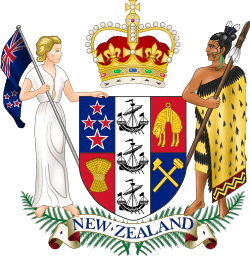Chief Justice of New Zealand
 |
| This article is part of a series on the politics and government of New Zealand |
| Constitution |
|
|
|
|
Related topics |
The Chief Justice of New Zealand (in Māori: Te Kaiwhakawā Tumuaki o Aotearoa) is the head of the New Zealand judiciary, and presides over the Supreme Court of New Zealand. Before the establishment of the latter court in 2004 the Chief Justice was the presiding judge in the High Court of New Zealand and was also ex officio a member of the Court of Appeal of New Zealand. The office is established by the Judicature Act 1908.
The Governor-General of New Zealand appoints the Chief Justice on the advice of the Prime Minister.[1]
The Chief Justice acts in place of the Governor-General if one has not been appointed or if the appointee is unable to perform his or her duties. When acting in place of the Governor-General, the Chief Justice is known as the Administrator of the Government.
Chief Justices
- Hon. Sir William Martin (1841–1857)
- Hon. Sir George Arney (1858–1875)
- Hon. Sir James Prendergast GCMG (1875–1899)
- Rt Hon. Sir Robert Stout GCMG (1899–1926)
- Hon. Sir Charles Skerrett KCMG KC (1926–1929)
- Rt Hon. Sir Michael Myers GCMG KC (1929–1946)
- Rt Hon. Sir Humphrey O'Leary KCMG KC (1946–1953)
- Rt Hon. Sir Harold Barrowclough KCMG CB DSO MC ED (17 November 1953–1966)
- Rt Hon. Sir Richard Wild GBE KCMG QC (18 January 1966–January 1978)
- Rt Hon. Sir Ronald Davison GBE CMG QC (3 February 1978 – 4 February 1989)
- Rt Hon. Sir Thomas Eichelbaum GBE QC (6 February 1989 – 16 May 1999)
- Rt Hon. Dame Sian Elias GNZM PC QC (from 17 May 1999)
References
- ↑ "Appointing Judges: A Judicial Appointments Commission or New Zealand?". Ministry of Justice. September 2002. Retrieved 12 June 2008.